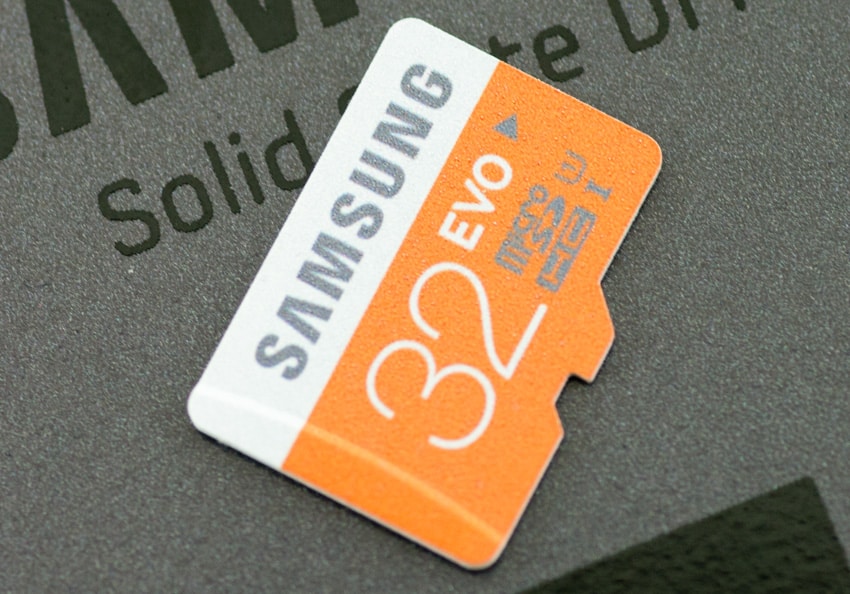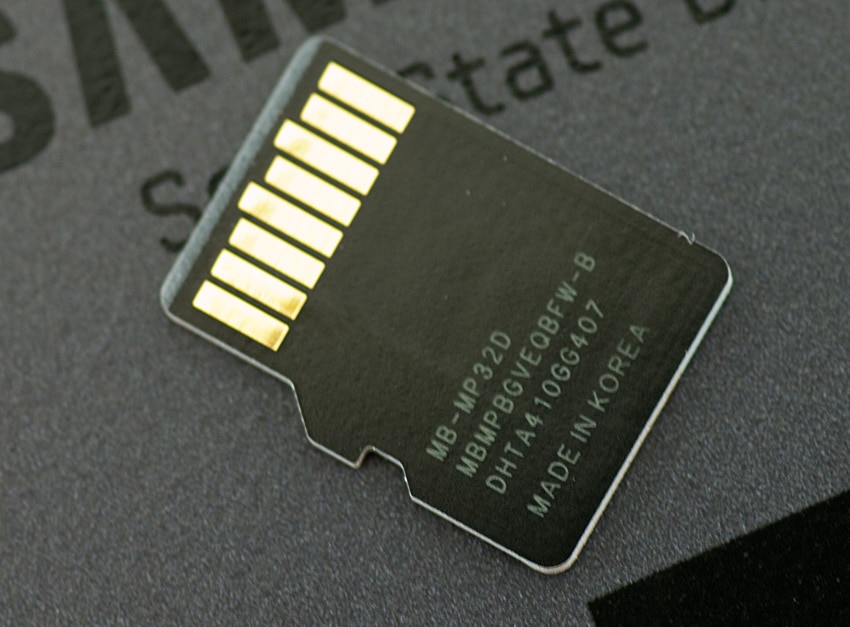We previously reviewed the new Samsung PRO microSD card (along with its SD iterations) and found it to be an excellent addition to the microSD market, even challenging the usually untouchable SanDisk line of flash cards. This time around, we are looking at the EVO microSD line, which offers a more mainstream profile than that of the PRO family and is specifically designed newer mobile devices such as smartphones and tablets. That said, the EVO cards are still quoted to post some pretty decent numbers, with Samsung claiming a potential of 48MB/s read transfer speed using a UHS-I interface. Like its SD companion, Samsung simply states that its write speed is slower than its transfer speed. Normally, we would be a bit unsure as to how it would perform based on such a generic statement, we are quite certain that it will post results on the same level as we saw in our previous EVO flash card review.

As far as its durability, there are no real surprises here. Samsung states that the cards are water, temperature, magnetic and x-ray proof with the ability to survive up to 24 hours in seawater, survive in temperatures from -25° to 85° Celsius, protect user data from damage caused by airport X-ray machines and resist up to 13 times the magnetic force of home theater speakers.
The Samsung EVO family of microSD cards come in capacities of 16GB, 32GB, and 64GB for a street price of roughly $15, $20, and $45 respectively. All cards are backed by a limited 10-year warranty.
Specifications
- Model: MB-MP32D
- Type: microSDHC Memory Card
- Class: 10
- Interface: UHS-I, compatible to HS interface
- Capacities: 16GB, 32GB, 64GB
- Performance: Up to 48MB/s transfer speed with UHS-I interface
- Voltage: 2.7~3.6V
- Environmental Specs:
- Operating Temperature: -25℃ to 85℃
- Non-Operating Temperature: -40℃ to 85℃
- Dimensions (W x H x D): 0.59" x 0.43" x 0.04"
- Weight: 0.017 oz.
- Warranty: Limited 10 years
Design and build
As you can see, Samsung’s completely rebranded flash cards also include the microSD EVO line with a new, attractive looking exterior design. The EVO microSD looks identical to its SD version with its white and orange casing as well as vibrantly printed white numbers indicating its 32GB capacity.

The Samsung logo lies at the top of the card while the bottom displays the speed class designation as well as the microSD card type, which is Class 10, UHS-1 compatible to HS interface. The Samsung EVO card is also packaged with an SD adapter that is simply branded with “SD Adapter for microSD.” The other side of the card show the 9 connector pins in addition to the model number. The backside also tells us that the cards were manufactured in Korea.
Performance
In this review, we will include the following comparables:
- Samsung microSDHC Plus
- SanDisk Extreme Pro microSDXC UHS-I
- Toshiba microSD Class 10 UHS-I
- SanDisk Ultra microSDXC
Using our Consumer Testing Platform, we measured transfer speeds from the 32GB Samsung EVO microSD card with IOMeter. Sequential posted read and write speeds of 44.4MB/s and 19.1MB/s respectively. The top-in-class SanDisk Extreme Pro microSDXC boasted reads of 90.9MB/s and write speeds of 74.7MB/s while the Samsung’s microSDHC Plus 32GB card clocked in at 71.44MB/s read and 20.08MB/s write. The SanDisk Ultra recorded sequential activity at 44.66MB/s and 14.29MB/s for read and write respectively. The Toshiba card showed the slowest results, measuring 34.3MB/s read and 12.1MB/s write.
When comparing random large-block transfers, the Samsung EVO posted 43.9 MB/s read with an impressive 32.0 MB/s write, the latter of which was surprisingly one of the best bunch. The SanDisk Extreme Plus measured read and write speeds of 85.9MB/s and 43.8MB/s respectively, while the SanDisk Extreme PRO microSDHC posted 87.6MB/s read and 13.4MB/s write. The Samsung microSDHC Plus 32GB hit 67.35MB/s read and the SanDisk Ultra 20.04MB/s write and 43.98MB/s and 2.45MB/s for read and write, respectively. The Toshiba microSD clocked in at 33.1MB/s read and 1.6MB/s write.
Conclusion
The new Samsung EVO microSD line is designed for the more mainstream demographic of consumers, specifically for those looking for reliable performance with their high-end smart phones, tablets, and cameras. The EVO Series microSD cards come in three different capacities, 16GB, 32GB, and 64GB each sporting a sleek white and orange design. These tiny flash cards are also water, shock, magnet, X-ray and temperature proof.
As far as performance goes, the Samsung EVO microSDs are quoted to deliver 48MB/s reads (with no indication of write activity) supporting a UHS Speed Class 1 and Class 10 video recording ratings. When we put it through our tests, it measured just below those figures with a sequential read and write of 44.1MB/s and 19.1MB/s respectively, while random activity boasted 43.9MB/read and 32.0MB/s write. The large-block random write speed we recorded was particularly surprising, and easily the best we have seen for its class.
The Samsung EVO line also offers a very competitive price point for their microSD cards, which go for a street price of approximately $15, $20, and $45 for the 16GB, 32GB, and 64GB capacities respectively. In comparison to cards of similar class, this is essentially the lowest priced card from a well-known brand name all the while offering superior performance. It’s safe to say that all of Samsung’s newly released flash cards are posed to make a serious impact on the market.
Pros
- Solid performance
- Great design
- Great Price
Cons
- None
Bottom Line
The 32GB Samsung EVO microSD memory card offers consumers great performance at an unbeatable pricepoint, making it one of the best cards available for its class.
Samsung 32GB EVO microSD at Amazon



 Amazon
Amazon